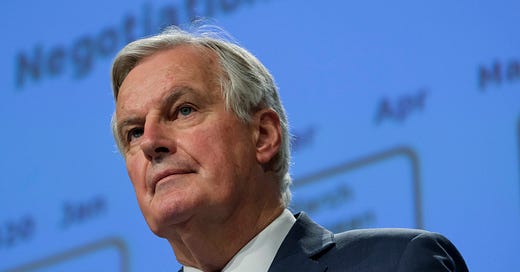Tricky road ahead for Michel Barnier, France's new Prime Minister
Barnier faces an uphill battle to command cross-party support in France’s bitterly divided hung parliament.
France’s youngest ever Prime Minister, 34-year-old Gabriel Attal, has been replaced today by the oldest premier in the country’s modern history, the 73-year-old Michel Barnier, famed in Britain for his role as the EU’s chief Brexit negotiator, writes Caitlin Allen.
Barnier - who hails from the centre-right Les Républicains party - faces a mighty challenge. President Macron has tasked him with forming “a unifying government in the service of the country” in order to break over two months of post-election political deadlock.
The once seemingly intractable task of resolving four, fractious years of Brexit disputes could soon pale in comparison to the uphill battle he now faces to command cross-party support in France’s bitterly divided hung parliament.
First, a quick recap of the political turmoil Barnier is entering. After suffering bruising losses to Marine Le Pen’s anti-immigration National Rally (RN) party in the EU elections, Macron made the rather reckless decision to call a snap parliamentary election back in June. Fearful of a victory for the hard right, parties on the traditional right, centre-right and left bandied together to block RN candidates from winning.
As a result, a leftwing coalition emerged as France’s biggest political force, securing 188 seats. But this was not enough to win a parliamentary majority. Macron’s centrist faction came second with 161 seats, Le Pen’s party came in third with 142 while Barnier’s traditional right-wing party came fourth, securing just 47 seats. With no outright victor, a stalemate has ensued.
News of Barnier’s appointment has gone down badly with the Left. Olivier Faure, leader of the Socialist party included in the left-wing coalition, declared it a “denial of democracy” for Macron to appoint a prime minister from the party that came fourth. Jean-Luc Mélenchon, leader of the hard-left France Unbowed party, has called for protests this weekend.
Meanwhile, Julien Odoul, an MP for Le Pen’s party, has criticised Barnier, over his age, labelling him the “French Joe Biden”, and accusing him of being a fickle opportunist with “no backbone”.
Le Pen, however, has cautiously welcomed the appointment. Perhaps for one of the very same reasons that her colleague has criticised him: his political shapeshifting.
For almost five decades, Barnier was considered a liberal-minded, centrist rightwinger, devoted to the European cause. But, during his unsuccessful bid to become the presidential candidate for Les Républicains in 2022, he surprised colleagues by lurching to the right.
Barnier’s views on immigration hardened, as he called for a three to five-year moratorium on non-EU arrivals to France, banning even family members from joining those already in France. The country's current immigration policy, he warned, was "out of control" and feeding “delinquency and Islamist radicalisation".
His simultaneous eurosceptic turn raised eyebrows in Brussels, as he called for France to regain legal sovereignty from EU courts. Much to the chagrin of Nigel Farage, who fumed at the time: “Michel Barnier is the biggest hypocrite ever born."
But Le Pen might not be so concerned about these apparent inconsistencies. She is perhaps simply pleased that he is drifting in the right direction.





